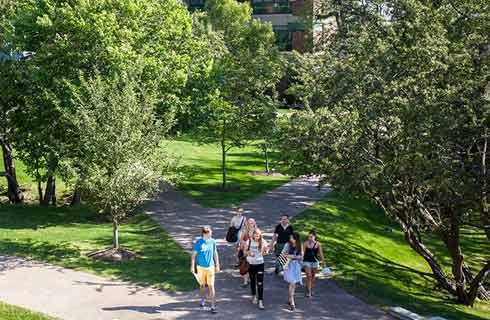- IDP China>
- 课程库>
- 自然科学>
- 自然资源与保护>
- 环境科学>
- Doctor of Philosophy in Civil and Environmental Engineering - Environmental Engineering and Science
土木与环境工程哲学博士-环境科学与工程
Doctor of Philosophy in Civil and Environmental Engineering - Environmental Engineering and Science

学历文凭
Ph.D.

专业院系
Department of Civil and Environmental Engineering

开学时间

课程时长

课程学费

国际学生入学条件
A bachelor’s degree from an ABET-accredited engineering program or from a recognized international institution is recommended.
A minimum undergraduate grade-point average (GPA) of 3.00 (on a 4.00 scale) on the equivalent of the last 60 semester hours (approximately two years of work) or a master’s degree with a minimum cumulative GPA of 3.00 is required. Applicants from an international institution must demonstrate strong academic achievement comparable to a 3.00 for an undergraduate or master’s degree.
Three Letters of Recommendation
Minimum TOEFL requirement- 92 internet (iBT); 580 paper-based test (PBT)
Minimum IELTS requirement- 7.0
Minimum IELTS Indicator requirement- 7.0
IDP—雅思考试联合主办方

雅思考试总分
7.0
- 雅思总分:7
- 托福网考总分:92
- 托福笔试总分:580
- 其他语言考试:Minimum Duolingo English Test requirement- 125
CRICOS代码:
申请截止日期: 请与IDP联系 以获取详细信息。
课程简介
环境工程与科学关注环境资源(例如水,空气,土壤)的质量和可用性以及影响环境资源的废物流。这个领域是动态的,最近发展到涵盖可持续性科学,替代能源和环境生物技术。威斯康星大学麦迪逊分校的环境工程与科学小组在废水处理,水处理,微生物生态学,微生物相互作用建模以及空气污染物检测等领域的实力得到国际认可。我们的核心员工在环境工程的生物学方面,水化学和空气质量以及新兴的生物信息学和生物燃料生产领域具有特殊的实力。我们在自然和建筑环境中进行应用和基础研究。结合了实验室实验,现场方法,分子生物学工具,中试规模的处理系统,
Environmental engineering and science is concerned with the quality and availability of environmental resources (for example, water, air, soil), and with the waste streams that impact them. The field is dynamic and has evolved to also encompass sustainability science, alternative energy sources, and environmental biotechnology.<br><br>The environmental engineering and science group at UW-Madison is recognized internationally for its strengths in the areas of wastewater treatment, water treatment, microbial ecology, modeling of microbial interactions, and the detection of air pollutants. Our core faculty have particular strength in the biological aspects of environmental engineering, as well as water chemistry and air quality, and in the emerging areas of bioinformatics and biofuel production. We conduct applied and fundamental research in both the natural and built environments. Laboratory experiments, field methods, molecular biology tools, pilot-scale treatment systems, analytical chemistry, and modeling approaches are combined to address scientific and engineering questions leading to a more sustainable water environment and better air quality.
Environmental engineering and science is concerned with the quality and availability of environmental resources (for example, water, air, soil), and with the waste streams that impact them. The field is dynamic and has evolved to also encompass sustainability science, alternative energy sources, and environmental biotechnology.<br><br>The environmental engineering and science group at UW-Madison is recognized internationally for its strengths in the areas of wastewater treatment, water treatment, microbial ecology, modeling of microbial interactions, and the detection of air pollutants. Our core faculty have particular strength in the biological aspects of environmental engineering, as well as water chemistry and air quality, and in the emerging areas of bioinformatics and biofuel production. We conduct applied and fundamental research in both the natural and built environments. Laboratory experiments, field methods, molecular biology tools, pilot-scale treatment systems, analytical chemistry, and modeling approaches are combined to address scientific and engineering questions leading to a more sustainable water environment and better air quality.
相关申请
 预科
预科 奖学金
奖学金 实习机会
实习机会 在校学习
在校学习 跨境学习
跨境学习 校园授课-线上开始
校园授课-线上开始 在线/远程学习
在线/远程学习
开学时间&学费
学费信息仅供参考,请与IDP联系以获取详细信息
| 开学时间 | 时长 | 学费 | 地点 |
|---|
学校排名

世界排名43
数据源:
泰晤士高等教育世界大学排名
本校相关课程

Bachelor of Social Work
学历文凭
Bachelor Degree
开学日期
课程费用总额


Bachelor of Arts in Zoology
学历文凭
Bachelor Degree
开学日期
课程费用总额


Bachelor of Science in Theatre and Drama
学历文凭
Bachelor Degree
开学日期
课程费用总额


Bachelor of Arts in Social Welfare
学历文凭
Bachelor Degree
开学日期
课程费用总额


Bachelor of Arts in Scandinavian Studies
学历文凭
Bachelor Degree
开学日期
课程费用总额


Bachelor of Science in Physics
学历文凭
Bachelor Degree
开学日期
课程费用总额










 美国
美国
